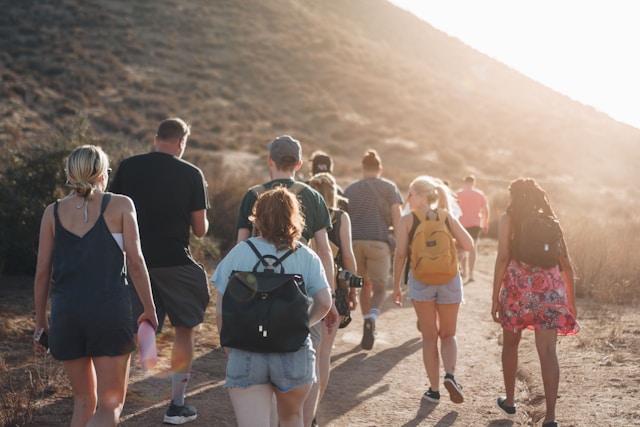Active tourism, which is a unique form of recreation, combines physical activity and deep immersion in nature, thereby expanding the traditional framework of travel. This direction allows not only to restore physical fitness and improve health, but also contributes to intellectual enrichment through the mastering of new skills and knowledge. Travelers in the process of active tourism encounter a variety of natural landscapes and cultural features, which deepens their understanding of ecological processes and promotes respect for nature.
The importance of active tourism is also emphasized in publications such as Forbes, which discusses trends in ecotourism and its impact on local economies and sustainable regional development. These trips provide unique opportunities for self-development and self-discovery, allowing participants to take on challenges that require both physical endurance and intellectual flexibility. Travelers learn to overcome obstacles while developing the ability to solve complex problems and adapt to changing conditions.
Thus, active tourism does not just improve physical fitness, but also influences the development of personal qualities such as determination, confidence, and self-reliance. These qualities not only improve the participants’ quality of life, but also contribute to their harmonious existence in society and nature. For those interested in different forms of betting as part of their recreational pursuits, understanding how to bet on dog races can also offer a stimulating and engaging activity, aligning well with the dynamic and strategic thinking developed through active tourism.
Interaction with nature
Interaction with nature is a key element of active tourism. It’s not just walking through beautiful places, it’s total immersion in the environment. Outdoor enthusiasts often choose routes through national parks or nature reserves, where they can not only enjoy the beauty of nature but also see rare species of animals and plants. Popular activities include hiking, kayaking, biking and more.
Examples of activities:
- Hiking: exploring trails and enjoying panoramic views.
- Kayaking: traveling on rivers and lakes to see aquatic life.
- Bicycling: exploring on two wheels, which is especially popular in mountainous areas.
Exploration and adventure
Exploration and adventure is the soul of active tourism. This aspect involves exploring new, unexplored places that are rarely visited by mass tourists. It involves not only physical activity, but also mental enrichment, as travelers often face challenges that require solving non-standard problems and overcoming difficulties. In the process of active tourism participants explore remote corners of the planet, where every step can lead to the discovery of something unique and unrepeatable – from forgotten trails to wildlife inhabited by rare species of animals and plants.
Such journeys are not only enriching in terms of physical sensations, but also provide a deeper understanding of the cultural and historical contexts of the regions explored. Travelers learn to be flexible, quickly adapt to new conditions, and effectively solve complex problems, which contributes to the development of personal qualities and strengthening of character. All these aspects make active tourism not just a vacation, but a constant source of inspiration and self-development. For more detailed insights and data, one can refer to Wikipedia to explore the extensive historical and cultural backgrounds of the destinations visited.
Adventure moments:
- Mountaineering: climbing peaks that require both physical fitness and strategic planning.
- Speleology: exploring caves, which allows you to learn about the geological structure of the region.
- Surfing: mastering the waves, combining sport and interaction with marine elements.
- These activities not only promote physical development but also help to develop problem solving skills and the ability to adapt quickly to new environments.
Learning and skills development
Active tourism promotes not only physical development but also intellectual development. Travelers learn terrain navigation, wilderness survival, and first aid in extreme situations. The skills of route planning, map reading and the use of GPS devices develop naturally during such travels. A particularly important aspect is learning safety precautions, which helps minimize risks during adventures. These skills not only build confidence but will also be useful in everyday life.
Geographical diversity
Active tourism offers unlimited opportunities to explore diverse geographical regions. From the snowy peaks of the Himalayas to the sultry deserts of the Sahara, each locale offers unique challenges and beauty. Importantly, while actively traveling, tourists gain an in-depth knowledge of the climatic features, flora and fauna of the region. Hiking across different continents provides an understanding of the geological structure of the planet and the characteristics of each landscape, which enhances the overall understanding of ecology and natural resource management.
Conclusion
Active tourism, which is a unique form of recreation, combines physical activity and deep immersion in nature, thus expanding the traditional framework of travel. This direction allows not only to restore physical fitness and improve health, but also contributes to intellectual enrichment through mastering new skills and knowledge. Travelers in the process of active tourism encounter a variety of natural landscapes and cultural features, which deepens their understanding of ecological processes and promotes respect for nature.
The importance of active tourism is also emphasized in publications such as Forbes, which discusses trends in ecotourism and its impact on local economies and sustainable regional development. These trips provide unique opportunities for self-development and self-discovery, allowing participants to take on challenges that require both physical endurance and intellectual flexibility. Travelers learn to overcome obstacles while developing the ability to solve complex problems and adapt to changing conditions.
